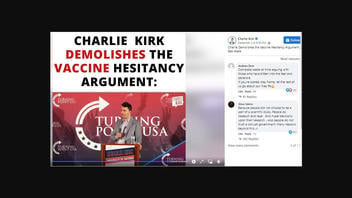
Does Vermont, with its nation-leading vaccination rate, also have the highest rate of COVID-19 cases per 100,000 residents? No, that's not true: Vermont ranks first in vaccination rates and 49th in rate of COVID cases.
The claim has circulated on social media, including in this December 2, 2021, Facebook video (archived here) posted to the Charlie Kirk account under the title "Charlie Demolishes the Vaccine Hesitancy Argument."
Facebook users saw this thumbnail and caption at the time of writing:
The video shows an exchange at the University of Arizona on November 15, 2021, between guest speaker Charlie Kirk, the founder of Turning Point USA, and a member of the audience, who says Kirk is misusing statistics and asks why conservatives should be hesitant to get the vaccine when former President Donald Trump got it. Kirk quickly switches the subject, making multiple false claims about the effectiveness of vaccinations and saying that mRNA injections are not vaccinations, that federal data show the vaccines are injuring people and that data from India and Africa show hydroxychloroquine and ivermectin do a better job fighting COVID.
False claim: Vermont has the highest COVID rate among U.S. states
At the 00:35 mark, Kirk says, "So let me ask you, what's the most vaccinated state in the country? ... So, no, it's Vermont. So and what state has the highest COVID rate?"
Kirk's point, that the most vaccinated places have the highest COVID rates, is incorrect. Statista.com's December 8, 2021, chart shows that while Vermont has the highest vaccination rate in the country, Vermont is nowhere near worst for COVID cases per capita. North Dakota has the highest rate of COVID-19 cases per 100,000 residents, while Vermont ranked 49th.
False claim: "They" changed the definition of vaccine for unspecified nefarious reasons
At the 1:20 mark, Kirk chides his questioner, who has challenged Kirk for making apples-to-apples comparisons between states and nations with different circumstances and demographics. Kirk, after laying out false claims about highly vaccinated populations suffering the highest COVID rates, says: "So let me tell you why. What's really happening here. First of all, they changed the definition of what a vaccine is. This is a treatment and a questionable one at that."
Lead Stories has previously debunked this claim, finding that critics of Merriam-Webster's updates to the definition overstated the update. The definition changed with the science of immunization via vaccination, but not to accommodate a non-working vaccine and not to cut out the longstanding definition regarding immunity-building. The mRNA vaccines against COVID do what all virus vaccines do: They train the body to develop antigens against a specific virus and attack it if a patient is infected.
Misleading claim: VAERS numbers are actual numbers of adverse events caused by vaccination
At 1:37 Kirk tells his questioner "I'm gonna read some of the VAERS numbers, from the Vaccine Adverse Event Reporting System, which is the actual numbers that show adverse events with the vaccine."
That's a clear misrepresentation of the information offered by VAERS. As Lead Stories has reported, the VAERS system is a wide-open, often repetitive, messy and incomplete list of any report any person with internet access wants to file about health events that happen after vaccination. Reports in VAERS are not actual adverse event data as they have not been verified and are the equivalent of a police blotter, which lists un-investigated reports of crimes. Correlation, the VAERS operators warn, does not prove causation, just as a phoned-in report to a police precinct is not per se evidence of a crime.
False claim: Ivermectin and hydroxychloroquine were key to slowing COVID spread in India and in African nations
Before he gets around to reading VAERS data, Kirk claims, at the 2:02 mark, that Uttar Pradesh, a state in India, made widespread use of ivermectin, to great effect in stopping the spread of COVID. Lead Stories checked that claim in November 2021, finding Indian officials credit a wide range of measures with slowing the spread, including strict lockdowns and widespread vaccination.
Kirk goes on at 2:30 to say "poor African nations" have stalled the spread of COVID-19 because "... they take anti-malarials with their breakfast food in Central Africa because malaria is a big issue and hydroxychloroquine and ivermectin and vitamin D, is proven to show and actually be able to heavily impact that."
Kirk's assumption is incorrect. "Hydroxychloroquine is NOT used for the treatment of malaria in most of Africa," said Professor Salim S. Abdool Karim, director of a U.S. National Institutes of Health research center in Durban, South Africa and a professor of global health at Columbia University's School of Public Health. In a September 2, 2020, email to Lead Stories, Karim said malaria is widely resistant to chloroquine:
Artemisinin is used to treat malaria. Hydroxychloroquine is used in a small number of patients for the treatment of auto-immune diseases - too small a group to have any impact on Covid-19."
Karim, who is a member of the African Task Force for Coronavirus organized by the U.S. Centers for Disease Control and Prevention, said it's too soon to know why some nations on the African continent have relatively low infection rates. "It has no easy or obvious answer - in short, no-one really knows but most have a speculative opinion on why this is so."

















